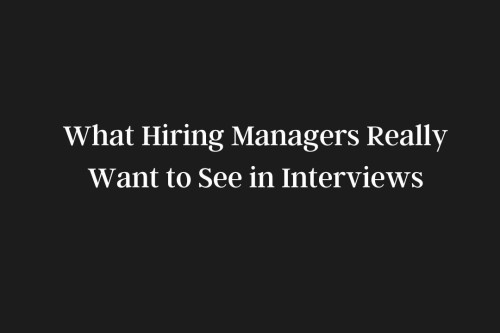
posted 15th May 2025
For many jobseekers, interviews are one of the most intimidating and nerve-wracking parts of the recruitment process. Whether you're walking into an office or joining a video call, there’s a lot to think about. This may include what you need to say, how to present yourself to the interviewer, and how you can make a lasting impression. By following several simple steps, you can remove the mix of nerves and self-doubt and make your interview a success.
At NuStaff, we prepare job candidates and work closely with employers who give us valuable insight into what employers value most and what they really want to see in interviews.
In this article, we break down the top traits hiring managers consistently praise, provide practical tips to help prepare you for interviews with confidence, thoughtful questions to ask the interviewer that will help you stand out from the crowd, and how our expertise will help you have a successful interview process.

The Top Traits Hiring Managers Look For
While experience and qualifications remain important when applying for jobs, often the success in an interview is determined just as much by a candidate’s soft skills, approach, attitude, and preparation.
For many employers, there are several qualities that help candidates stand out in job interviews to show their excellence. These include:
1. Preparation and Research
Preparation and research are key ahead of a job interview. Candidates who can show they have taken the time to learn about the company beforehand have an excellent chance of standing out. Having a good understanding of the company’s values, recent developments, and the role’s responsibilities will demonstrate your genuine interest for the job.
You can do this by:
- Researching the company’s website and recent news articles for more updates.
- Reviewing the job specification in detail and tailoring your answers accordingly.
- Mention specific facts or achievements during the interview to show initiative and that research has been undertaken.
2. Genuine Enthusiasm
Walking into an interview with a positive attitude and authentic enthusiasm can leave a lasting impression. Employers value candidates who express genuine excitement about the opportunity to work for them as well as explaining the reason why they want to work at the company.
You can do this by:
- Talking about what excites you about the role and the company.
- Letting your tone and body language reflect your enthusiasm.
- Being specific about what makes the role and business a good fit for you.
3. Clear and Confident Communication
Employers are drawn to job candidates who can demonstrate clear and concise communication in the interview room. Rather than the interview being about having all the right answers, the experience is about expressing yourself as a candidate in a structured, thoughtful way.
You can do this by:
- Using the STAR method (Situation, Task, Action, Result) to answer competency questions.
- Speaking to the interview, or panel, at a steady pace while avoiding jargon where possible.
- Practicing speaking aloud beforehand to improve your delivery and body language.
4. Adaptability and Self-Awareness
Candidates who can demonstrate being able to adapt to change and reflect on their own performance are often seen as reliable and resilient. Based on that, employers want to know that you are open to constructive feedback and are comfortable with change.
This can happen by:
- Sharing examples of how you have previously adapted to new processes, changes or overcame setbacks.
- Discussing what you have learnt from your experiences in previous roles and how you’ve grown.
- Being honest and transparent about areas you’ve improved on and what motivated you to make those changes.
5. Curiosity and Engagement
Being inquisitive and engaging in your interview shines a light on your interest beyond the surface level. Employers are drawn to candidates who are keen to learn more about the role, and how they can contribute long-term.
You can do this by:
- Asking questions about team goals, future projects, and success measures.
- Expressing interest in training and development opportunities at the company.
- Articulating your vision, as well as showing that you are thinking about the bigger picture and your place in it.
Common Red Flags That Raise Concerns
While there are many positive traits to master an interview, there are an equal number of red flags to consider.
To avoid certain behaviours surfacing during an interview, it is essential to avoid the following common red flags that act as an indicator that you may not be the right fit for the job. Here are five common red flags that hiring managers frequently mention as warning signs:
- 1 Lack of Research
Just as employers carry out due diligence to narrow down job applications, it’s important for candidates to show they carried out research on the job and company in preparation for the interview. Going to an interview without basic knowledge or understanding of the company suggests disinterest – which may signal to the employers that the candidate is applying for roles randomly and without strategy.
A way to avoid this is to prepare a few comments or questions specific to the business.
- 2 Negativity About Previous Employers
In an interview, speaking poorly about former managers or companies can reflect badly on you as a candidate and will give the impression that you may struggle with professional relationships.
You can avoid this by:
- Keeping answers constructive and focused on what you have learned as much as possible.
- Framing positively your reasons for leaving your previous position.
- 3 Vague or Overused Responses
Vague or overused responses such as “I’m a perfectionist” don’t provide real insight into your experience.
To avoid this, you can:
- Use measurable outcomes when describing your achievements to date.
- Prepare 2–3 stories based on your previous experiences to show your value and contribution in the workplace.
- 4 Overconfidence
Confidence is a positive trait to have in an interview, but it’s also worth remembering that there is a risk of coming across overconfident in front of interviewers. Being too self-assured can be as damaging as lacking confidence, as it may suggest difficulty working with others or being resistant to constructive feedback.
A way for you to overcome this is to:
- Be proud while staying humble and collaborative
- Acknowledge the role that your previous teams or mentors have played in your success to date.
- 5 Not Asking Any Questions
Interviews consist of employers getting to know the candidates by asking questions, but always remember that communication is a two-way street. Finishing an interview without asking the employers a single question, whether it be about them or the company, can show that you are not engaged or prepared.
You can avoid this by:
- Preparing 3–5 thoughtful questions to ask the interview or panel.
- Focusing on topics such as company culture, success measures, and team structure to demonstrate your interest.
Preparation is one of the most powerful tools to help you succeed in an interview. Being well-prepared not only improves your performance, but it also helps calm nerves and project confidence.
Here’s a checklist to help you prepare effectively:
- Research the company’s mission, culture, and latest achievements.
- Re-read the job description and tailor your answers to match the listed requirements.
- Practise answering common questions aloud using the STAR method.
- Prepare and rehearse 2–3 examples that demonstrate your core strengths.
- Write down at least 3 questions to ask the interviewer on the day.
- Dress appropriately and professionally
- Print or bring digital copies of your CV and any supporting documents
- Pack a pen and notebook
- Double-check the location, time or video link of the interview.
- Arrive at the location or log online 10–15 minutes prior to the interview.
- If you bring your phone with you on the day, make sure it is on silent mode, or eliminate background distractions if the interview is online.
- Greet your interviewer with a smile and maintain eye contact throughout the interview.
Questions to Ask That Show Genuine Interest
Asking strong questions shows you’re thoughtful, curious, and engaged in the opportunity – not just there to be evaluated. Consider asking questions such as:
- What does success in this role look like over the first six months?
- What are the team’s biggest goals for the year ahead?
- How do you support employee development and progression?
- Are there training or development opportunities available?
- Can you describe the company culture or team dynamics?
- What are the next steps in the interview process?
- What do you personally enjoy most about working here?
Ending an interview with strong, thoughtful questions shows maturity and enthusiasm. It also gives you a better feel for the role and the company culture.
Additionally, by writing your questions down and bringing them with you to the interview, you will be able to demonstrate your preparation and organisation skills.
NuStaff Is Here to Help
At NuStaff, we believe every candidate deserves to walk into an interview feeling confident and well-prepared - whether it be a first full-time role or an opportunity towards leadership.
We genuinely care about the future of job candidates and offer personalised coaching, CV reviews and constructive feedback to support you through every stage of the recruitment journey.
If you’re ready to take the next step, we’re here to help.
Contact NuStaff for Expert Advice
Get in touch with our team today:
📞 Call us: 03442 645 456
📧 Email: info@nustaff.com
🌐 Visit: www.nustaff.com


